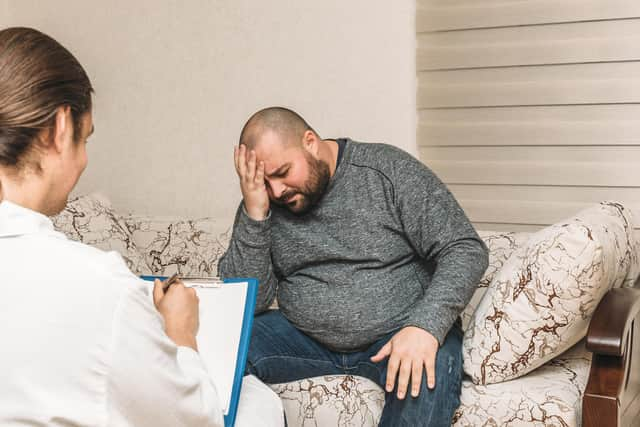Mental Health Awareness Week: antidepressant use soars but access to therapy plummets during Covid pandemic
and live on Freeview channel 276
Millions more prescriptions for antidepressants have been dispensed across the UK since the start of the Coronavirus pandemic, analysis by NationalWorld can reveal.
The latest NHS figures also show referrals for talking therapies fell dramatically during the same period, suggesting patients may be missing out on the best care.
Advertisement
Hide AdAdvertisement
Hide AdIt is advised that medication goes alongside a wider treatment plan, including psychological therapy.


Experts say it is “crucial” patients get the right support at the right time.
Antidepressant use soaring
Even before the pandemic millions of prescriptions for antidepressants were dispensed monthly around the UK.
But as the Covid crisis continues to take a profound toll on the mental health of the nation, the number of prescriptions to treat common mental health conditions like anxiety, depression and stress is reaching new heights.
Advertisement
Hide AdAdvertisement
Hide AdDuring the pandemic (March 2020 to February 2021), more than 78 million prescriptions for antidepressants were dispensed in England according to data sourced from OpenPrescribing.net (compiled by EBM DataLab and the University of Oxford) – 3.5 million, or 5%, more than the same period the year before.
On average 6.5 million prescriptions have been dispensed each month since March 2020. Before the pandemic it was around 6.2 million.
In Northern Ireland, more than 3.5 million prescriptions were written out by GPs during 2020 according to figures from HSC Business Services Organisation – 4% more on 2019’s figures.
Prescription data is not yet available for the pandemic for Scotland and Wales, but both saw a 7% increase in antidepressant prescriptions dispensed between 2018/19 and 2019/20.
Advertisement
Hide AdAdvertisement
Hide AdThe most recent figures from Public Health Scotland show more than 7 million prescriptions for antidepressants were written out during 2019/20, while in Wales, 6.3 million prescriptions were dispensed, according to the Welsh Government.
There are limitations to the data, though. No information is given on the number of people who received prescriptions, how many times a person received one, how much was prescribed and how long the prescription was for.
Access to talking therapies plummeting
Lucy Schonegevel, associate director for policy and practice at Rethink Mental Illness said the figures indicate “that more people have needed support to manage their mental health” during the pandemic.
“Medication can play an important role in treatment for depression but there should always be the option of other forms of evidence-based therapies such as talking therapies.
Advertisement
Hide AdAdvertisement
Hide Ad“Continued investment in Improving Access to Psychological Therapies (IAPT) services is welcome, and key to increase access for treatment and reduce waiting times.
“It’s crucial that people can access the right support at the right time so that they can look towards recovery.”
However, according to official figures from NHS Digital, mental health referrals to the IAPT programme in England have plummeted during the pandemic, suggesting patients living with a mental health condition may not be accessing the most appropriate care.
In England, more than 1.3 million people were referred for talking therapies during the pandemic (March 2020 to February 2021) – 19% fewer than during the same period the year before.
Advertisement
Hide AdAdvertisement
Hide AdThat means nearly 325,000 people may have missed out on a referral.
Thousands were yet to start treatment too with 26% of referrals not yet having started therapy.
Billions invested in mental health services
Governments across the UK are under increasing pressure to put mental health at the forefront of the UK’s recovery from the pandemic.
A UK Government spokesperson said it is “absolutely committed” to supporting people and millions would be put into mental health services.
Advertisement
Hide AdAdvertisement
Hide AdThe spokesperson said: “We have published the Covid-19 mental health and wellbeing recovery action plan, backed by £500 million of funding, to expand mental health services and provide people with the support they need.
“Alongside this, mental health services for children and adults continue to receive a growing share of the NHS budget, with funding to grow by at least £2.3 billion a year by 2023/24.”
A spokesperson for the Scottish Government said it has been working to “remove the stigma” around mental health and antidepressants and in 2021/22 it is investing in “excess of” £1.2 billion into mental health services.
Joe Brogan, head of Pharmacy, Health and Social Care Board Northern Ireland, added: “Antidepressants are an important element of therapy for the treatment of depression and we encourage, where appropriate, the prescription of antidepressants, among other therapies including non-pharmacological treatments, such as counselling/talking therapies, and in line with the NICE clinical guidelines.”
Advertisement
Hide AdAdvertisement
Hide AdThe Welsh Government said it is providing an extra £9.4m investment in children and young people mental health services.
What to do if you need help
If you or someone you know needs help find out more information about mental health conditions and what to do on the NHS website. More information and advice can also be found on the Rethink Mental Illness website.